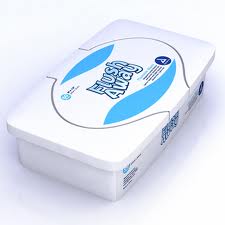Flushable wipes, tampon applicators, and other personal care items often advertised as "disposable" can wreak havoc at wastewater treatment plants and cause sewage overflows. Read more about the problem and your role n prevention in this news story from WCAX TV or watch the newscast.
At Montpelier's wastewater plant, Bob Fischer takes a great interest in what you flush down the toilet. Fischer, who operates the city plant, says over the past few years he's seen it all.
"We find a lot of tampon applicators; we find shop rags," he said, "toothpicks, dental floss, small toys."
But what he says he's finding with increasing regularity is disposable wipes. Wastewater operators across the state and the country say it's a growing concern, especially with the booming growth of products claiming to be "flushable."
In wastewater parlance, they fit into a broad category called "non-dispersibles"-- basically everything besides your number 1 and 2s and the toilet paper you use. Fischer says this debris clogs up sewage lines and pump stations like a clogged artery in a heart.
"People are using them more now and flushing them down the toilet instead of throwing it in the garbage can-- often right next to it," Fischer said. "It all gets together, each one person does a little bit and it gets together in the system, combines up and plugs it up."
Back in March, Montpelier experienced a major clog that ended up sending 360,000 gallons of raw sewage into the Winooski River. It was caused by rags and other debris clogging up a 30-inch sewer line near the Statehouse.
For Fischer, in addition to environmental concerns, what's perhaps more at stake is the city's wastewater treatment infrastructure.
"This is about $60 million just for this facility right here," he said. "It's hundreds of millions for the collection system. It's probably the most equity any Montpelier resident has-- probably more than their home-- and they just don't realize it's here."
The pricey plant is constantly sifting debris out of the 2 million gallons it treats each day, from where it enters the plant at the head works to aeration ponds and a final UV light treatment before being released into the Winooski.
Average toilet users on Main Street for the most part say they follow the rules of the restroom.
The trade group that represent wipes manufacturers recently revised voluntary guidelines for what makes their products "flushable." The wastewater industry would prefer mandatory guidelines. For Fischer, the answer is simple: "When in doubt, throw it out," he said. "When you're sure, throw it out anyway. Just throw it out. Don't put anything down the toilet-- ever."
A potty problem people can help prevent.
